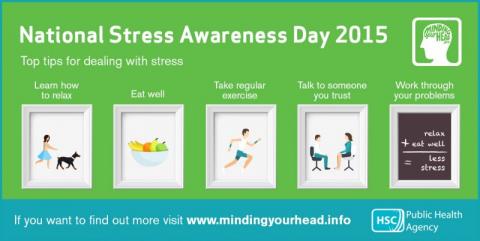Take steps to deal with stress at work

It’s National Stress Awareness Day today so the Public Health Agency (PHA) is encouraging employers and employees to take practical steps to deal with stress in work life.
The theme of this year’s National Stress Awareness Day is ‘Employee Wellbeing as a Worthwhile Investment in Your Business’.
“A certain level of stress is part of daily life,” said Amanda O’Neill, Senior Health and Social Wellbeing Improvement Officer with the PHA.
“Stress is the feeling of being under high levels of pressure. Anyone can feel stress and it can be caused by many things in life including work, financial difficulties or family life.
“Feeling stress at work can affect your work-life balance. Work-life balance is the balance between time and energy spent on work compared with that spent on other aspects of life such as leisure, exercising, socialising and relaxing. A poor work-life balance can affect your physical and mental health.”
Signs in your personal life of a poor work-life balance could include neglecting other areas of your life, feeling low, anxious or irritable, changes in sleeping or eating patterns, increased alcohol intake, and fatigue.
Signs in your work life of a poor work-life balance may include low job satisfaction, lateness, absenteeism, avoiding colleagues, low motivation, low productivity, and poor decision making.
“When you feel stressed, it can be hard to solve problems and it can have a knock-on effect on everything you do,” said Amanda.
“Stress is not an illness itself, but it can cause serious illness if it isn't addressed.
“We are urging both workers and employers to take steps to reduce the level of stress in the workplace. This will benefit not only employees themselves in terms of their wellbeing, but it also makes business sense as it will help deliver better productivity and less absenteeism.”
There are a number of ways to tip the work-life balance back to achieve a healthy medium. An important step is recognising the symptoms and addressing the problem.
Employers can help to reduce the level of stress experienced in the workplace by monitoring staff workloads, setting appropriate and achievable deadlines, promoting a healthy work-life balance and providing a healthy working environment where staff feel able to speak freely about their stress pressures without the fear of judgement.
Amanda concluded: “There are some practical steps we can take ourselves to deal with stress, such as learning how to relax, eating well, taking regular exercise, talking to someone you trust and working through your problems. The key is to take positive action before stress really begins to have a negative impact on your health and wellbeing.”
The PHA’s booklet ‘Steps to deal with stress’ which includes lots of practical ways of dealing with stress is available at www.mindingyourhead.info
The Minding Your Head website also includes a directory of mental health services in Northern Ireland.
